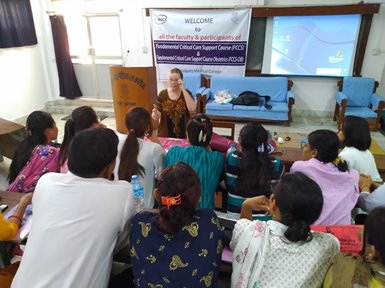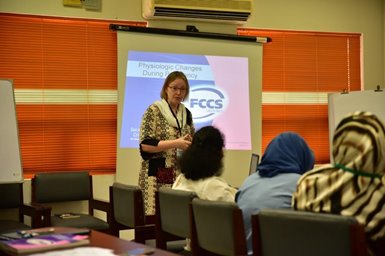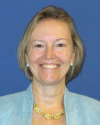Mary J. Reed, MD, FCCM, began teaching FCCS about 25 years ago. From there, her involvement expanded to teaching multiple SCCM courses, helping to develop courses, and teaching the courses overseas.
Dr. Reed is a specialist in surgery and critical care at Geisinger Medical Center in Danville, Pennsylvania, USA. In 1997, she took the FCCS course and brought it home to Geisinger. In 2006, she brought a second SCCM course to Geisinger and began teaching Fundamental Disaster Management (now FCCS: Crisis Management). Through Dr. Reed’s leadership, Geisinger now hosts all six FCCS courses. As an FCCS editor and contributor, Dr. Reed also helped develop FCCS textbooks and course content for FCCS: Crisis Management, FCCS: Obstetrics, FCCS: Resource Limited, and the new FCCS: Surgical.
In addition to Geisinger, for the past 15 years, Dr. Reed has taken the FCCS courses around the world to more than 13 countries (she lost count when adding them up), including Swaziland (now called Eswatini), Kenya, Sudan, Nigeria, Sierra Leone, Qatar, Pakistan, United Arab Emirates, Oman, Paraguay, El Salvador, and Belize.

Photo courtesy of Mary J. Reed. |
One of the benefits of the FCCS courses, particularly overseas, is that they are very teachable and scalable, Dr. Reed said. In 2010, after a 7.0-magnitude earthquake struck Haiti, Dr. Reed and SCCM colleagues led by Amado Baez, MD, MPH, PhD, FCCM, went to the Dominican Republic to teach FCCS and FCCS: Crisis Management to dozens of medical students. “There were a lot of victims of the earthquake coming across to the Dominican Republic. They were dying on the way to Santo Domingo, and there was a hospital in Barahona that they could stop at and stabilize,” Dr. Reed said.
The following year, she again taught FCCS and FCCS: Crisis Management in Haiti as just-in-time preparation for Hurricane Irene. She was volunteering with Project HOPE on board the naval hospital ship USNS Comfort as part of a routine medical mission when Hurricane Irene threatened the country. Dr. Reed found four FCCS manuals on the ship left over from the prior earthquake response and used them to prepare a quick course for the nonintensivist physicians that included a mix of critical care and crisis management. “The other surgeons were colorectal surgeons,” Dr. Reed said. “The closest thing I got to any other intensivist was the CRNAs and the anesthesiologists.”

Photo courtesy of Mary J. Reed. |
Dr. Reed has also taught SCCM courses in countries with limited resources, such as Sudan, where she and her Geisinger colleague Abbas K. Ali, MD, FCCM, who is originally from Sudan, introduced the Pediatric FCCS and FCCS: Crisis Management courses. The courses were taught in Sudan several years in a row. Sudan now recognizes critical care as a specialty and offers a critical care residency. “That was huge, and FCCS was the cornerstone of that from a teaching standpoint,” Dr. Reed said. “Of course, it was a small part of a big effort by the Sudanese physicians, the diaspora, and the government itself.”
Dr. Reed pointed out that, while the FCCS courses do not automatically offer accredited continuing education (ACE) credit, it is not difficult for each hosting institution to apply to offer ACE. “For ACE, the institution has to show an educational gap. It has to have objectives. It has to substantiate it with literature or at least discussion. It has to prove that the course provides a service,” she explained. “. The objectives are at the beginning of the lectures, and the educational gap is teaching the basics of a specialty that most people don’t have.”

Photo courtesy of Mary J. Reed. |
One of the reasons Dr. Reed loves teaching is witnessing that moment when it clicks for a student in the real world—an intern at 2:00 a.m. remembers not to start a patient on noninvasive ventilation if the patient is vomiting. “If you love what you do—which I do—you want to be able to spread that knowledge because it saves patients,” Dr. Reed said. “I enjoy teaching people, but when you teach them something you know they’re going to use, that’s going to save patients, then it just takes it to a higher level.”



